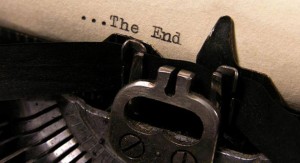
Image Credit: https://www.helpingwritersbecomeauthors.com/category/editing-your-novel/page/2/
Yay! You’re finished! Congratulations. Pour yourself a nice flute of champagne and relax. You’ve earned it. You just wrote a novel.
If you just wanted to write a novel to write a novel and maybe brag about it to some people, then by all means, get on with it. If you want to share it with some of your closest literary friends or maybe send an excerpt to the New Yorker or Atlantic Monthly—still take your time enjoying the champagne. Put the whole thing out of your mind for at least a few days. When you’re still in the mindset of cranking out the words, it’s easy to get attached to passages or characters that actually drag down your writing. After a nice rest, prepare yourself for the revision cave.
The Writing
Now’s the time to look carefully at your writing, its mechanics and logical constructions. Style has nothing to do with it; it’s strictly a close, word-by-word reading. Check your diction. Do you really need to use “twirl” twice in one short paragraph when you envision two different motions (other words: “swirl,” “spin,” “turn,” “stir”)? Do you really need to use different speech tags (said, shouted, murmured, whispered, accused, countered, replied, yelled, etc) when the characters are having a superficially low-key conversation and everything is actually just “said”? Jeffrey Eugenides raises a similar complaint about Oscar Wilde’s diction in The Picture of Dorian Gray; Wilde doesn’t abuse his thesaurus, he merely dramatizes everything. No one ever just sits, everyone “flings himself down” on something. If Dorian is uncomfortable, he always does things nervously, and when he’s nervous, he always twitches. Pick the right word for the right image.
The Arc
Go through and, at the end of each chapter or section or what have you, record the characters’ progressions in that section, how it fits into their overall transformations, and major plot developments. If a character regresses at some point, does it make sense? People regress all the time. There’s usually an impetus. You can’t crowd everything under the umbrella of “it’s the character” just because that’s how they were at the start. Even if you’d prefer to keep a character static, make sure the justification comes through. Laying out developments in this outline can also help you pinpoint trouble spots in pacing.
Excise, Excise, Excise
Just because it’s a novel and you can make it as long as you want doesn’t mean you need to devote lines to everyone’s hair color and outfit or the entire layout of a room. Of course, there will be parts that need more clarification, but for the most part, you can afford to cut out entire paragraphs without confusing anyone. Whatever you leave in has to have a purpose. You don’t necessarily have to follow Chekov’s Rule, but if you’re going to spend the time to note what your characters order from Starbucks, then their orders have to mean something. Hot chocolate? Iced coffee during a Russian winter? Drip coffee instead of a latte? Americano instead of drip coffee? In real life, that doesn’t indicate anything significant, but in a novel, it matters (unless your point is that it doesn’t actually matter, in which case you have more thematic issues to sort anyway). Oh, and that huge existential monologue/soliloquy with some beautifully flowery phrases you wrote in a feverish haze of inspiration can stand to lose half its length. Hemingway says of his writing process, “I write one page of masterpiece to ninety-one pages of shit. I try to put the shit in the wastebasket.” We’re not all minimalists like Hemingway, though. Hold onto some of your pretty, introspective bits. The good bits.
Sidebar:
If you need a break or want to procrastinate even more, spend some time on www.reasoningwithvampires.tumblr.com, a snarky passage-by-passage critique of Twilight. It’s an equal opportunity hater with regards to all the things people find wrong with Twilight, so be forewarned…but definitely pay attention to perhaps the most indisputable problem with the series: it’s just not well written. There are periods of rampant thesaurus abuse; there are periods of predictable diction; there are moments when the limited first person is suddenly omniscient; there are illogical sequences of action, in which someone walks away and suddenly reappears to respond to something; there are sloppy (rather than stylistic) comma misuse. (What’s the difference between a sloppy and a stylistic one? In Twilight: “He lay, smiling hugely, across my bed, his hands behind his head, his feet dangling off the end, the picture of ease.” In Joan Didion’s “Goodbye to All That”: “It is easy to see the beginnings of things, and harder to see the ends.” Didion said in an interview, “every word and every comma and every absence of a word or comma can change the meaning, make the rhythm, make the difference.” Sometimes you have to earn the right to flaunt grammar. Life’s not all fair.) Forget Bella and Edward’s questionable status as “heroine” and “the best dark brooding boyfriend ever.” When your words and their order distract a reader from the throwaway details they describe, something is wrong.
By Robin Yang
Robin Yang was one of the Campus Clipper’s publishing interns, who wrote an e-book on how to write a novel. If you like Robin’s writing, follow our blog for more chapters from this e-book. We have the most talented interns ever and we’re so proud of them! For over 20 years, the Campus Clipper has been offering awesome student discounts in NYC, from the East Side to Greenwich Village. Along with inspiration, the company offers students a special coupon booklet and the Official Student Guide, which encourage them to discover new places in the city and save money on food, clothing and services.
At the Campus Clipper, not only do we help our interns learn new skills, make money, and create wonderful e-books, we give them a platform to teach others. Check our website for more student savings and watch our YouTube video showing off some of New York City’s finest students during last year’s Welcome Week.
Become a fan on Facebook and follow us on Twitter and Instagram





